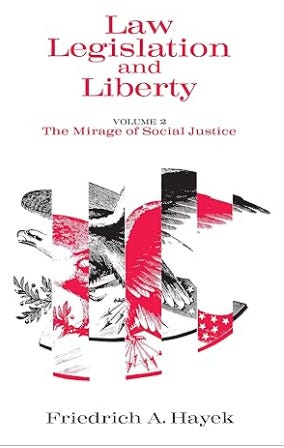The Road to Serfdom, Session 5: The Mirage of Social Justice
Correcting for “unfair” outcomes ends up denying real human rights.
On Netflix’s Love is Blind, a man told the woman he was wooing, “Anyone who works 40 hours a week should have housing food and the health care they need.” He then added with a flourish, “Is that debatable?” While he was speaking, the camera moved to capture the woman's beaming expression of agreement.
Despite their agreement on social justice, she chose someone else to be her partner.
In earlier sessions, we explored how those who advocate for "freedom from necessity" identify themselves as freedom fighters.
Few didn’t enjoy comedian and writer Mindy Kaling in The Office. In a speech at the Democratic National Convention, she claimed there was a “freedom to work one job and afford your rent.”
Hayek would have us consider this question: “Is there a scale of values, on which reasonable people can be expected to agree, which would justify a new hierarchical order of society and is likely to satisfy the demands for justice?”
Asking that question exposes the fallacies of social justice. Social justice engineers would have to select what is valued and impose a social hierarchy to determine who gets what. Achieving any particular social justice outcome would require using coercive methods by central authorities.
Kaling seemed reasonable to her cheering audience. How many people would agree with the FEMA leader who argued that disaster relief should be prioritized based on gender identity? Here is the rationale for his position: “LGBTQIA people, and people who have been disadvantaged already, are struggling. They already have their own things to deal with. So when you add a disaster on top of that, it’s just compounding on itself.”
Last week, we considered the Rule of Law as a pillar of liberty because it limits the power of government and affords people to choose what to make of their lives, based on their personal values within the bounds of general rules. Hayek set out a guideline for rule-making: “In framing legal rules, we should not be able to predict which particular person will gain and which will lose by their application.” So, when Kamala Harris promises 20K to every black entrepreneur, it is clear her social justice proposal is not consistent with the Rule of Law.
Arguments for human rights are often conflated with social justice. Is the meaning of human rights shifting as the meaning of freedom drifts into freedom from necessity?
During his historic 2016 trip to Cuba, President Obama listened to Raul Castro critique American human rights and remarked, “President Castro, I think, has pointed out that in his view making sure that everybody is getting a decent education or health care, has basic security in old age that those things are human rights as well. I personally would not disagree with him.”
Of course, Raul Castro knew nothing of human rights.
Dissenters in Cuba are still being brutally imprisoned. Health care may be free, but standards of care are low, and basic medical supplies are lacking. Many Cubans live in abject poverty.
What about the “right to good healthcare”? Does an alcoholic have a right to a government-sponsored liver transplant? Does an infertile couple have a right to fertility treatments paid for by taxpayers? Does an individual who eats six donuts a day have a right to diabetes treatment gratis? Does a transgender individual have a right to free sex reassignment surgery?





